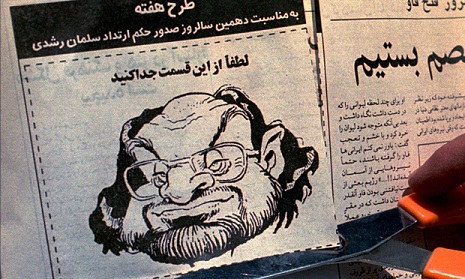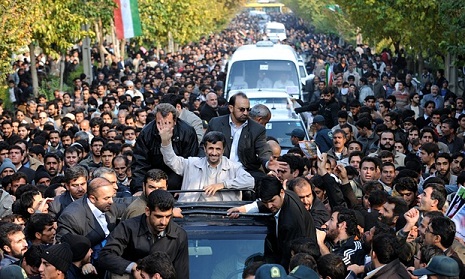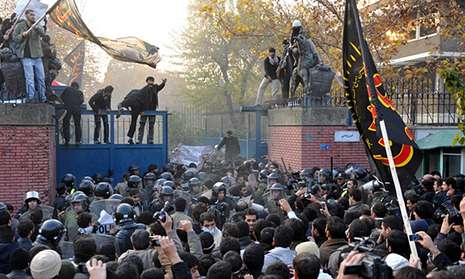1941 The UK becomes fearful that Iran will join forces with Hitler owing to the strong links formed between Iran and Germany during the 1930s. The UK and Russia invade Iran and jointly occupy the country, forcing King Reza Shah to abdicate. He dies in exile in 1944 and UK troops remain in the country until 1946.
1953 Iranian prime minister, Mohammed Mossadegh, who has attracted the ire of Britain in 1950 for attempting to nationalise the British-owned Anglo-Iranian Oil Company, is ousted in a coup sponsored by UK and US intelligence services.
1979 Following the Islamic revolution, Britain closes its Tehran embassy.
1980 Iranian gunmen take over Iran’s embassy in London, taking hostage 26 people, including embassy staff, visitors and a police officer. Six days into the siege, the gunmen kill one of the hostages and throw his body out of an embassy window, prompting the SAS to storm the building, killing five of the six gunmen and rescuing all but one of the remaining hostages.
1988 The British embassy in Tehran is reopened.

A cartoon of Salman Rushdie in the Iranian newspaper Abrar asks readers to cut the head off the British writer on the 10th anniversary of the fatwa
1989-1998 In February 1989, Iran’s supreme leader, Ayatollah Ruhollah Khomeini, issues a fatwa ordering Muslims to kill Salman Rushdie for his book Satanic Verses, which Tehran declares blasphemous. The author goes into hiding and diplomatic ties with the UK are broken. In 1992, three Iranians, including two embassy staff, are booted out of the UK after an alleged plot to assassinate Rushdie is uncovered. In 1998, Tehran changes its position on Rushdie and says it no longer stands by the fatwa and would not encourage anyone else to act on it. Diplomatic relations are restored to a certain degree.
September 2001 Jack Straw becomes the first British foreign secretary to visit Iran since 1979 revolution.
2004 Tensions mount between the countries, with Iran unhappy about US and UK troops fighting near Shia holy cities in Iraq. Iranians protest outside the UK embassy in Tehran in May. In June, Iran detains eight British sailors for three days after their vessel reportedly strays into Iranian waters. The same month, the UK – along with Germany and France – drafts a resolution highly critical of Tehran’s unwillingness to cooperate with International Atomic Energy Agency (IAEA) inspectors over Iran’s nuclear programme.
June 2009 President Mahmoud Ahmadinejad is re-elected. The opposition claims electoral fraud and there are mass protests across Iran. The country’s supreme leader, Ayatollaah Ali Khamenei, says the unrest was encouraged by “arrogant powers” in the west and singled out Britain as the “most evil of those powers”.

December 2009: Mahmoud Ahmadinejad waves to wellwishers from his car in Isfahan, south of Tehran
November 2011 After a report by the IAEA about Iran’s nuclear programme, the UK announces sanctions against the country and breaks off relations with its banks. On 27 November the Iranian parliament votes for the British ambassador to Iran to be expelled from the country. Two days later, protesters attack the UK embassy in Tehran. The UK government describes the incident, in which buildings were burned, petrol bombs and stones were thrown and the offices were ransacked, as “outrageous” and claims that the protesters have the backing of the Iranian government. The UK government orders all Iranian diplomats to leave Britain within 48 hours.
14 July 2015 After years of negotiations and sanctions, Iran reaches a deal in about its nuclear capacity with the US, UK, France, Germany, Russia and China. Iran promises to dismantle a considerable amount of its nuclear infrastructure, in exchange for sanctions being lifted. The deal, reach in Vienna, is helped by the election in June 2013 of Hassan Rouhani, who is thought to be a more moderate president than Ahmadinejad. After Rouhani’s election, the then UK foreign secretary, William Hague, says time has come to reopen the British embassy in Tehran.
August 2015 The British embassy in Tehran is reopened and the foreign secretary, Philip Hammond, visits along with a delegation of UK business leaders.
















































